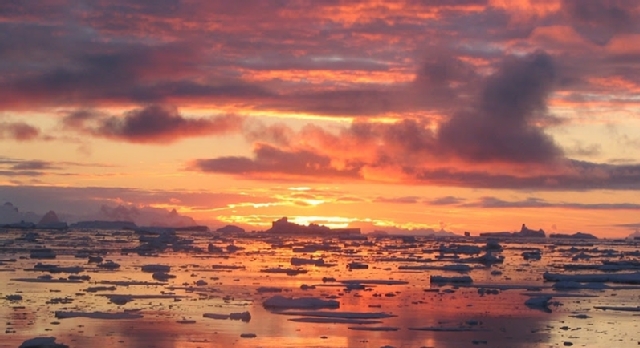
Antarctic sunset. Photo taken by Samantha Dillon.
Wang Symposium: Activist fights to preserve the precious resource of water
Maude Barlow didn’t start out interested in water. Nothing of the sort, she recalled recently from her home in Ottawa, Canada. In the mid-80s, Barlow was working in the women’s movement and focusing on laws that would eventually be known as the as NAFTA. While looking over various trade agreements at the time, Barlow noticed that water was listed as a tradable commodity. Odd, she thought at the time.
And unfair.
“I thought (water) should be free for all, and considered a resource,” she mused before she spoke this spring at the Wang Center Symposium, which focused on water – both its growing scarcity and value, as well as its impact on socioeconomic trends.
“I guess since I wasn’t a lawyer or a scientists, I saw these issues with fresh eyes,” said Barlow, who has a degree in English literature.
Since that epiphany, Barlow has become a leading voice on water conservation and the view that it is a resource that should be conserved and administered as a public, not private resource.

Maude Barlow
In her latest book, “Blue Covenant” Marlow urges against the privatization of water resources, such as is happening in Africa and Latin America. If water sources aren’t under some sort of public entity – then “it really doesn’t matter if you have all the water in the world” the resource will go to the highest bidder, rather than be conserved for the public good, she stated. For the most part Europe has kept much of its water resources in public hands – and the attempt by Pickens aside – so has the U.S.
During the upcoming presidential elections in the U.S., those concerned with green issues need to press the candidates not only climate change issues, but on water issues, she said. She also stressed that water should not be casually swapped across borders from one area that is water rich, such as Canada around the Great Lakes, to areas of the California – a proposal that has been considered in the past.
As for what a single individual can do? Stay involved, press your public officials on the situation, be water wise in how much water it may take to grow a crop or produce a commodity you take for granted. And along that line, she added, don’t drink bottled water. Ever.


